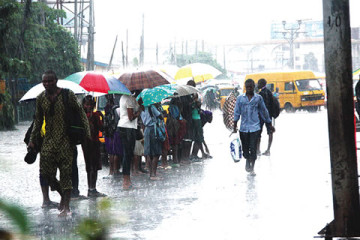The rains are here, protect yourself
Commuters at Ikeja bus stop during a downpour in Lagos… recently
The rainy season is here in full force. While farmers rejoice that it’s a sure sign of better things to come in terms of bountiful harvests, the fact remains that the season also comes with its own challenges, especially because it’s also a season when infections and diseases spread from person to person.
For one, researchers say the wet season offers a perfect breeding ground for bacteria and germs, hence the usual sicknesses that afflict people as the season debuts.
At this time, health problems such as cold, flu, malaria and gastroenteritis are very common, and you need to guard against these avoidable infections. Where you have succumbed to any, you should seek medical attention.
What are the possible rainy season diseases and how do you escape them? Read on!
Cholera and diarrhoea
Family Doctor, Dr. Greg Akinduyile, warns that cholera spreads more quickly during the rainy season. He explains that as water sweeps through the streets and collects in open drainages, it takes along with it the cholera pathogen which might end up in water sources such as the rivers, lakes and streams where the pathogen can survive, thrive and spread.
Worse still, he says, aquatic animals such as fish and shellfish can carry cholera pathogen, hence the need to wash hands thoroughly after handling them, while they must also be thoroughly cooked before eating.
He says, “When unsuspecting people use contaminated water without first boiling and filtering it, the likely result is that they will contract cholera.
“Equally important is the need to cover foods properly, because flies can spread cholera by depositing the pathogen on food. That’s why we advise people to eat hot foods during this season, as no pathogen can survive a really hot surface.”
He warns that in case anyone contracts cholera, they should see a doctor, as the infection kills faster than anything.
Dengue fever
Akinduyile describes dengue fever as a “seasonal disease” that is rampant in wet season. According to him, the dengue virus is transmitted to humans via the bite of an infected mosquito.
“When a mosquito bites a person who has dengue virus in his or her blood, it becomes infected with the dengue virus and it can later transmit that virus to healthy people by biting them,” he says.
The way out, he counsels, is to prevent stagnant water from forming around the homes; while water containers must be kept well covered in order to prevent the vector mosquitoes from laying their eggs in unattended water containers.
Colds and coughs
Akinduyile also warns that colds and coughs are very common during the rainy season, as bacteria generally infect the respiratory system.
He describes common cold as a “viral, infectious disease of the upper respiratory tract that primarily affects the nose, with symptoms such as cough, runny nose, sneezing, sore throat and fever caused by rhinovirus.”
Consultant Chest Physician, University of Nigeria Teaching Hospital Enugu, Dr. Cajetan Onyedum, notes that respiratory illnesses may be worse during the rainy seasons, even though they are also present during the warm weather.
The physicians counsel us to eat balanced diet that will give us immunity from diseases and infections.
Stomach trouble
They also warn that this season is notorious for making people contract stomach infection such as gastritis, gastroenteritis, and food poisoning. Akinduyile says any of these stomach bugs can result in diarrhoea, painful cramps, nausea and vomiting.
Stomach infection can be caused by food or water that is contaminated by pathogens such as Escherichia coli, Salmonella, Shigella and H. Pylori.
He says it is one reason why physicians counsel people against eating outside while the season lasts, because the humidity generated by the weather allows bacteria to grow and fester, and could be transferred into foods that are handled carelessly.
He urges proper cooking of foods such as meat, fish and eggs.
Prevent rainy season feet!
The feet suffer all sorts of infections during this weather, as the nails and the spaces between the toes could succumb to foot infections when soaked in dirty water.
The most common feet problem during the rains is fungal infections between the toes. Fungal infection in the feet is caused when the shoes are wet after the rains. Athlete foot is another major problem this season, as the skin becomes white or greenish, oozing a foul smell to boot!
The family physician advises that if you soak your feet in rain water, wash them with soap and water, paying particular attention to the spaces between the toes and the areas surrounding the nails.
Beyond this, he urges the use of rain boots, which not only keep your feet warm, but also prevent you from soaking your feet in dirty water in the first instance!
Clean hands
Environmentalists describe hand-washing as a “do-it-yourself vaccine” that prevents infections and saves lives. Indeed, if there’s any time you should maintain rigorous hand hygiene, it is this season.
Akinduyile says you must wash hands immediately you arrive home or office before touching other people or food. The same thing goes after you use the bathroom. He warns that it is not exactly good enough to just dab the hands with sanitiser; rather, he counsels, the appropriate thing is to wash the hands with soap and clean water at regular intervals during the day.
“That way, you won’t only keep yourself germ-free, you also help others who come into contact with you to be germ-free, as germ transmission reduces as everyone imbibes the culture of proper hand hygiene,” the physician enthuses.
PUNCH.








